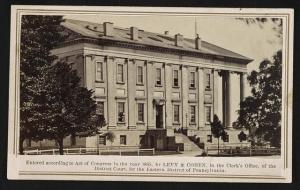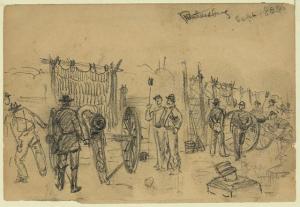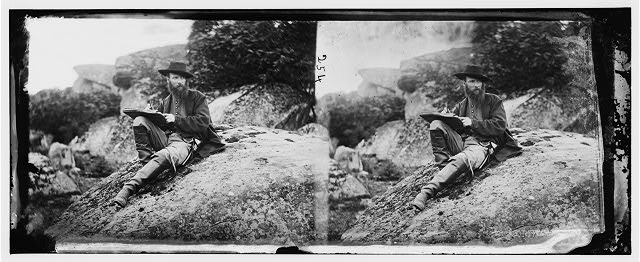… and legislators?
“X” from Petersburg is concerned about getting more men into the Confederacy’s armies to try to at least partially offset additions to Northern forces.
From the Richmond Daily Dispatch September 12, 1864:
From General Lee’s Army.
(From Our Own Correspondent)
Army of Northern Virginia,
near Petersburg, Va., September 10, 1864.
Atlanta has fallen; Forts Powell, Morgan and Gaines have been surrendered into the hands of the enemy, and Jack Morgan is dead. Truly, misfortunes never come alone. But super-add to these reverses the rejoicing which rescind throughout the entire North, and bear in mind that the enemy announce large accretions to their military numbers, and you have the military situation.
The month of September will likely witness no grand military effort, either on the Virginia or Georgia military chess-board. Grant and Sherman are, meanwhile, not idle. Their camps are busy in preparation; and, backed by the authorities at Washington, they are making ready to deal us hard knocks by the “early” frost. Fous est abhorte deceri is a motto worthy to be remembered and acted upon. If the enemy are engaged in gigantic preparations for our overthrow, it behooves as to be girding on our armor and marshaling on hosts to meet them.
The Army of Northern Virginia [n]eeds reinforcement to its fighting materiel. The reinforcement must come at once! Can the Government get them? I answer yes. In the first place, there are to-day not less than five thousand able-bodied detailed men in the quartermaster, commissary, medical and ordnance departments of this army, whose places can be supplied by negroes and, disabled men — the negroes to fill such places as teamsters and drivers, and disabled men the position of clerks and messengers. Many of these men, from favoritism or other causes, have been kept out of service for years, if, indeed, they have ever shouldered arms. Let General Lee and Secretary Seddon will it, and these men can be under arms and acting as good soldiers in ten days. Again, there are men detailed for useless and evasive duty all over the State. Let these be returned. I hear it said that forty thousand names on the muster rolls of the Army of Northern Virginia have opposite their respective names the simple word “detailed.” Again, the State of Georgia, with a readiness that does her credit, has called her reserves to the front. If the States of Virginia, North Carolina and South Carolina, will just now imitate her example, Hood and Lee can both receive in this way valuable and appreciable reinforcements. Let them be called for at once. Ere thirty days shall have elapsed Grant will receive his drafted or volunteer men. All that Grant expects them to do is to man his already almost impregnable breastworks, whilst his old troops are disengaged for work on the flanks. Shall General Lee be reinforced by men, or shall this army, worn with the fatigue and exhaustion of a long and bloody conflict, be forced, in the hour of its triumph, to lose the price of victory by a lack of men? Some of the papers are calling for Congress and the Legislature to assemble. If it is meant for them to assemble in Richmond to take up arms and march to the front, I say brave! [bravo?] If they are expected to meet there to talk and legislate, I say no. There is already legislation enough. Let the laws be executed. The President has power enough.–Let the “justice, equity and necessity” exemptions be curtailed, as well as those of the agricultural classes — all of which emanate directly from the War Office–and we shall have men enough and to spare. It is not necessary to rob the States of their judges, clerks and sheriffs to fill the armies. It is not necessary to destroy States’ rights. The material for recruiting the arms-bearing soldiers is in the army and under control of the War Office. The men can be furnished in ten days if Secretary Seddon determines that it shall be done.
Let not our authorities and our newspaper press lay the flattering unction to their hearts that victories can be achieved without men; nor that other delusion, which is inevitable on the heels of each disaster, that the people are always at fault and skulking. The Government is not a myth, but a real, tangible entity, and is clothed with the power to recruit the armies. Will they do it, as they have done before, by the impartial exercise of the powers and trusts confided by the representatives of the people?
Now is the accepted time–let there be no delay. The teamsters, cooks, ambulance-drivers, clerks, and other detailed men, can reinforce General Lee five thousand men. Why should the authorities refuse the brave men in the trenches the companionship and support of such obvious and necessary reinforcements? The reserves are within ten days call — no need of an extra session and new legislation. The men are at hand — all that is needed is the order, so strangely withheld, for them to fall in. If we delay till frost, or for new legislation, the events of the interval may supersede the necessity of legislation. But new grants of power are unnecessary. Execute the laws, and all will be well. –Perhaps this communication may fall without fruit. If its suggestions are heeded, the country will be benefitted; if ignored, I will not answer for results. Reinforce Lee and Hood are the suggestions of prudence and common sense, which I cannot suppose our authorities will willfully disregard.
The enemy have nearly finished their branch of the City Point road to the Weldon railroad; and everything indicates a purpose — so soon as they are strong enough — to make a bold effort to seize the Southside railroad.
This morning, about 3 o’clock, the enemy massed eleven skeleton regiments in front of Finnegan and Harris’s skirmish lines, driving them in from two lines and capturing some thirty or forty prisoners. Finnegan quickly rallied his skirmishers, retaking the second or inner line, and re-establishing his pickets at that point. Our line is now receded about two hundred yards in some places, but not more than fifty yards in other places, of what it was on yesterday. There was considerable cannonading during this little affair; but all is quiet at this writing.
X.
Alfred Rudolph Waud drew the picture of the Union artillery at Petersburg. According to the Library of Congress Mr. Waud was suffering just like many soldiers during this time in his life. On the back of the drawing he wrote:
There is a lot of picturesque material now, in the trenches, but I cannot get around to attend to it. I am down, sick and helpless with an acute attack of dysentery. It will be weeks before I get out-if I ever do- Firing is constant- I cannot sleep for it. I send what sketches I have on hand. Will write a letter by next mail. Yrs resfly A.R. Waud alias Tapley.



